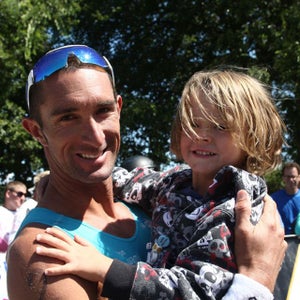Exploring The Life-Triathlon Balance
Written by: Jordan D. Metzl, MD
Scott, a 47-year-old triathlete, came in to see me last week with Achilles tendinitis. When we started talking about his Achilles and his training, I sensed something else was bothering him.
Scott told me about his love of triathlon, his newfound addiction to the sport and how much he loved training and doing races. Scott’s problem, however, was more involved. Despite his love for triathlon, his family was very concerned about how much time he spent training away from home.
“Doc, I’ve got two kids at home, a wife who thinks I’m gone and training way too much, and I feel like I’m always letting somebody down.” He went on to say, “I can’t train enough, that’s why I’m here with an injury, but my wife and kids think I’m over the top and gone all the time.”
Scott’s concerns are quite common with triathletes. Let’s face it: The pursuit of the ultimate speed, body and split time is inherently selfish. Trying to balance real life and triathlon is an ongoing struggle. There are some triathletes who gravitate too far to one side so that their entire lives center on triathlon. And there are others who swing too far the other way; they don’t train enough and show up in my office with injuries from loading too much training volume on bodies that aren’t properly conditioned. Most athletes try to find the balance between the extremes.
In thinking about Scott’s plight, and about balancing fitness and life, a local holistic health practitioner named Samantha Caplan came to mind. Samantha’s approach to finding balance seems to be the healthiest for athletes such as Scott.
Holistic health approaches the body and the issues of balance by breaking down healthy living into primary and secondary food groups. Primary foods include relationships, career, spirituality and physical activity. Secondary foods are everything that an athlete puts into his or her mouth.
According to this model, athletes need both primary and secondary foods in balance and feeding off one another to reach maximum nutrition, fitness and happiness. When a primary food is “off,” athletes tend to overcompensate with another primary food and/or secondary food. Athletes who become out of balance in their primary food group, often through the breakdown of other social relationships, tend to over-exercise and obsess over food and nutrition.

Of course, we all go through periods around specific races where we ramp up our training, and according to this model, load too much of our primary food group into the exercise category. When this happens, other parts of our lives suffer. Those who are successful in keeping balance, however, recognize this trend and make the appropriate changes in their lives. They learn how to ramp training up and, when appropriate, ramp training down.
Sometimes other things need to change as well. Necessary changes might include doing shorter races which require less training time, or scheduling family vacations in conjunction with races or making family training time. They might also include socialization with friends outside of triathlon, a book club or a theater subscription. These are all ways, according to Samantha’s model, that triathletes can restore a healthy balance to the primary and secondary foods of their lives
Fixing Scott’s Achilles was the easy part. A bit of physical therapy, some strengthening, a pair of off-the-shelf orthotics and he was as good as new. Having had some experience with searching for balance, I had him look into the concept of holistic healing. He is currently in the process of making his triathlon career work for everyone in his life.
For all you triathletes out there searching for life-triathlon balance, keep up the good work. This is an ongoing pursuit. Remember that whatever balance means in your life, finding a healthy one while pursuing this fabulous sport is as important as crossing the finish line.
Jordan D. Metzl, MD, Drjordanmetzl.com, is a nationally recognized sports medicine physician at Hospital for Special Surgery in New York City. In addition to his medical practice, he is a seven-time Ironman finisher and a 27-time marathon runner.